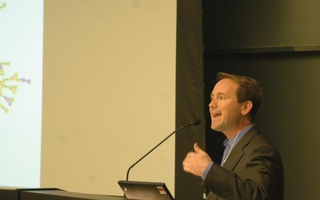Though Faculty of Arts and Sciences Dean Michael D. Smith has stressed the significance of the six FAS working groups in closing the school’s projected $110 million annual deficit, the committees have made mixed progress in their task of drafting the highly anticipated budgetary proposals aimed at closing that gap.
The committees were tasked in the spring with generating budgetary recommendations, and their progress to date runs the gamut from the social sciences working group, which has drafted two full-length proposals, to the School of Engineering and Applied Sciences working group, whose members seems unclear or even unaware of their particular budgetary charge.
FAS spokesman Jeff A. Neal wrote in an e-mailed statement that the groups have no set deadline for the recommendations, though he expects that the process will continue into next semester “if necessary.” In contrast, a timeline posted on the FAS planning Web site in June designated the end of October as the deadline for working groups to draft recommendations for FAS’ top academic deans.
According to FAS Divisional Dean of Social Sciences Stephen M. Kosslyn, Smith has said that all six working groups’ recommendations are due to him by Thanksgiving.
At an open forum two weeks ago, Smith said he had seen the early recommendations of some of the working groups and that he will eventually compile a summary of the groups’ recommendations.
“The work that the working groups are undertaking right now remains critical,” he said. “I can’t see a way for us to just make administrative actions to get there...We do need your ideas. We do need your participation. We do need the recommendations that will come out of the working groups.”
In recent weeks, most members referred inquiries regarding the committees to Neal or the chairs of their groups. But even FAS Divisional Dean of Science Jeremy Bloxham, who chairs the sciences working group, declined to comment last week and said Smith had informed him that he would like the group to progress further in its work before speaking with The Crimson. FAS Divisional Dean of Arts and Humanities Diana Sorensen—who chairs the humanities working group—could not be reached for comment.
“There are some processes we have to go through,” Smith said. “We’re not going to be publicly debating these sorts of things—that doesn’t make sense at all.”
SOCIAL SCIENCES MOVE AHEAD
The social sciences working group has drafted two “very temporary, transitional” proposals—concerning the division and FAS, respectively—and is now soliciting feedback from faculty, staff, and students in the division, said Kosslyn. The committee met several times over the summer and “could have been done at the end of the summer if the Faculty and students had been around” to give feedback, he said.
The committee had been primarily charged with cost-cutting to pare down the division’s budget—not including sponsored research and operations and maintenance—by roughly one-third. But the group’s goal soon changed from cutting back to balancing the budget by generating new revenue and “stretching what we have further,” according to Kosslyn.
The working group started with “divergent thinking,” in which the committee strove to generate as many ideas as possible. At its first fall meeting in early September, the committee moved into a phase of “convergent thinking,” during which it scrapped ideas deemed unfeasible. “The ground rules for the first phase was you could think of everything. Nothing is sacrosanct because you could have ideas that spin off of those,” Kosslyn said. “Now we’re beyond that.”
After gathering feedback, the working group will decide by Oct. 7 which ideas to keep, discard, refine, or replace and will submit their final recommendations to Smith by mid-October.
ALL QUIET ON THE COLLEGE FRONT
After the two College working groups gathered for a joint introductory meeting in May, several members said they did not receive any communication from top administrators until September. Dean of the College Evelynn M. Hammonds said she met with the staff heads of the College groups over the summer but did not organize any official meetings because most students were not on campus.
Read more in News
Harvard Doctor’s Paintings StolenRecommended Articles
-
FAS Makes Limited Progress in CutsThe six working groups charged with addressing the Faculty of Arts and Sciences’ $143 million budget shortfall are scrambling to
-
FAS Waits For Dean’s InitiativeIn the midst of last year’s financial crisis, Faculty of Arts and Sciences Dean Michael D. Smith assembled six “working groups” to establish top Faculty priorities.
-
 Panel Unites Social Scientists
Panel Unites Social Scientists -
Kosslyn To Step Down as Social Science Div. DeanFaculty of Arts and Sciences Dean of Social Science Stephen M. Kosslyn has accepted a position at Stanford to lead its behavioral sciences center, FAS Dean Michael D. Smith announced Monday.
-
Wireless Internet Spotty Around MidnightRecently, Harvard students working late at night have been freed periodically from the distractions of the Internet—or hindered from lack ...
-
UC To Publish Student-Faculty Committee ReportsIn a push to increase transparency in Harvard’s administration, the Undergraduate Council will publish reports from student-faculty committee meetings on their website this academic year.













